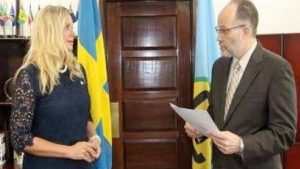 Caribbean Community (Caricom) Secretary General Irwin LaRocque yesterday called for a new model for development finance saying that the existing gross domestic product (GDP) per capita should not be the principal measurement used in determining the development status of a country.
Caribbean Community (Caricom) Secretary General Irwin LaRocque yesterday called for a new model for development finance saying that the existing gross domestic product (GDP) per capita should not be the principal measurement used in determining the development status of a country.
“We will continue to advocate for the use of a more accurate and realistic measure of development which considers vulnerability, including exposure to natural disasters and other exogenous shocks,” LaRocque said as he accepted the accreditation of Elisabeth Eklund, the new Swedish ambassador to the 15-member grouping.
“In the interest of realising our economic aspirations as a community, we believe that a new paradigm in development finance needs to be considered,” he added.
Caricom leaders have in the past complained at the measurement used by developed countries as well as international financial institutions in providing assistance to their regional countries, saying it severely affects their socio-economic development.
LaRocque also urged Sweden to use its position in two major international organisations to highlight the unfair labelling of some of Caricom countries as “non-cooperative tax jurisdictions”.
“As we seek to diversify our economies and build our services sector, some of our member states, engaged in financial services, have been labelled as ‘non-cooperative tax jurisdictions’. This is despite the fact that the countries in question are not so designated by the relevant global authorities, such as the Financial Action Task Force and the OECD Global Forum.
“As a member of the EU and the OECD, Sweden can assist in encouraging these bodies to be guided by the informed position of the relevant global regulatory authorities and desist from their unnecessary seemingly punitive actions,” he added.
The secretary-general recalled the decision earlier this year by the European Union Council to screen some Caricom countries to determine whether they were co-operative tax jurisdictions using new criteria.
“The stated criteria go beyond the generally accepted international tax transparency and accountability standards which our countries have been meeting over the past several years,” he said, noting it was extremely onerous for small countries to address different international initiatives which dealt with the same, similar or related subject matter yet stipulated different sets of criteria.
“There appears almost to be a predisposition to blacklisting our countries,” LaRocque said, adding that a major consequence of this blacklisting was the “de-risking” strategies being employed by certain international banks which had resulted in the withdrawal of crucial correspondent banking relationships.
“This particularly affects our indigenous banks and other financial services entities and could lead to the disconnection of our small economies from the global economy and international trade. Its socio-economic impact would be disastrous, given that remittances which are the main source of income for many of our poorest citizens will be affected,” the secretary-general said.
LaRocque said he welcomed Sweden’s efforts as a non-permanent member of the United Nations Security Council to raise awareness in that forum of the importance of the conservation and sustainable use of marine resources.
He said this was one of the priority areas of our region and the community looked forward to Sweden’s continued support for UN Sustainable Development Goal 14, which seeks to “conserve and sustainably use the oceans, seas and marine resources for sustainable development”.
“Our countries are vulnerable to economic and environmental shocks compounded by the effects of climate change. Therefore, global agreements on sustainable development and climate change are of special significance for the community.
“Most of our member states bear a heavy debt burden, brought on in large measure by reconstruction after major climatic events, in a region designated as the ‘most natural disaster-prone in the world’,”LaRocque said.
Ambassador Eklund noted that her accreditation was a continuation of years of building bilateral relations with Caricom and a bi-regional dialogue between Caricom and the countries of the Nordic region. Sweden is one of the countries in the Nordic Group with which Caricom has a Memorandum of Understanding on Political Dialogue and Cooperation.
Ambassador Eklund stated that the UN was central to Sweden’s foreign policy and the UN’s Agenda 2030 was a top priority. She listed humanitarian actions, poverty reduction, sustainable development, and climate change as areas of interest for her country.
